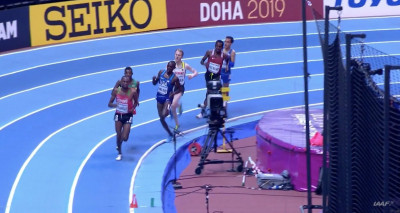After Ridiculous DQs At The 2018 IAAF World Champs, The IAAF Rule Book Needs To Be Modernized & The Visa Issue Is A Disgrace
By LetsRun.com
March 2, 2018
BIRMINGHAM, England — If you were hoping to see the stars compete in the finals at the 2018 World Indoor Championships, Friday was a disastrous day. First with World and Olympic hurdles champ Omar McLeod of Jamaica already out with visa issues, news came down that the heavy favorite in the men’s 800, Emmanuel Korir of Kenya, could not secure a visa as well (so much for the being part of the Commonwealth meaning anything), and now it has come out that 2014 World Indoor champ Ayanleh Souleiman, one of the favorites in the 1500, could not secure a visa.
Then once the track action got underway this morning at the first full day of action at the Arena Birmingham, the results were shocking.
The world’s fastest man at 400 meters this year — Bralon Taplin of Grenada — was sent home. In the same heat, Abdalelah Haroun of Qatar, the 2016 World Indoor silver medallist, also was sent home along with everyone else in his heat. Yes, every single person in a heat was eliminated. Then in the men’s 3000, US star Paul Chelimo — a big-time gold medal contender — was eliminated.
What? How could that be? How could so many big stars fail to show up in form at a global championship?
The answer is simple. They weren’t eliminated because they weren’t ready to perform. They were eliminated because they were all DQ’d for various infractions of the IAAF rule book, which is very outdated.
Haroun false started, Taplin and everyone else in heat 3 of the 400 were DQ’d for stepping on the line during one of the first two turns (although we rewatched the race multiple times and couldn’t see anything from the naked eye) and Chelimo was DQ’d for losing his balance and stepping over the rail on lap 14 of a 15-lap race in which he finished more than five seconds ahead of the guy in the heat who would have been the final time qualifier. Three more runners in Chelimo’s heat were disqualified as well.
 Chelimo gets DQd. Flotrack screenshot of IAAF tv feed via @flotrack
Chelimo gets DQd. Flotrack screenshot of IAAF tv feed via @flotrack
By rule, the decisions were the correct call. The IAAF rule book really only offers one penalty for an infraction — a disqualification. And that’s absurd. In most sports, an official can use discretion when calling a game-altering penalty.
The IAAF rule book needs to be modernized. Minor infractions that don’t change the outcome of the race in any way shouldn’t result in a DQ. That’s way too harsh.
One of the beauties of track and field is that there is no subjectivity to determining who the winner is — the first person across the line, the person who jumps the highest or farthest is the winner. But the rule book could easily be modernized in a way that would still eliminate subjectivity but allow all of these stars to avoid their needless DQs for infractions which didn’t materially impact the race.
When four people are disqualified for losing their balance in a race that is 3000 meters long, something is wrong. On a banked track, if you lose your balance on a turn, there is a good chance you might step off it. What these stars did did not affect the order of finish at all.
Yesterday, messageboard poster “reformer” had some fantastic ideas on how the rule book should be modernized that he or she shared yesterday. Among his ideas were two that would have worked nicely today — Time Penalties and Extra Distance for false starts.
- Time Penalties: If someone steps on the line in a 400, you don’t just DQ them. You just give them a time penalty of some sort. So if you still auto-advanced in the heat by a ton like Taplin did, you’d be fine. The same thing could apply in a 3k, or if there is no material advantage gained in a distance race, you could just overlook it.
- Extra Distance: Make people run extra distance if they false start. For false starts, there shouldn’t be a DQ on the first false start. Instead, just move the athlete back and let them run (“reformer” suggested moving them back 1% so 1 meter for a 100, 4 meters for a 400). That way if a star like Haroun today or Usain Bolt down the road false starts due to jitters, he can still move on instead of being DQ’d from a heat everyone in their right mind knows they would have cruised in. We know the false start rule was put in to save time but it will still save time as most runners can’t afford to run an extra 1%. And it would add drama, make for great TV and potentially save a huge star.
The ideas of “reformer” really are fantastic. Check their other ones out – including a monetary fine here: Ways to modernize the IAAF rule book.
As for the visa situation, we still can’t believe it. Three of the biggest expected stars at the meet aren’t competing because they couldn’t get a visa. People can say the agent or federations deserve the blame and that may be true but until we hear otherwise we are blaming the meet organizers for not ensuring this was done ahead of time. Can’t some bureaucrat flex some muscle and get an Olympic champion into Britain within 24 hours?



